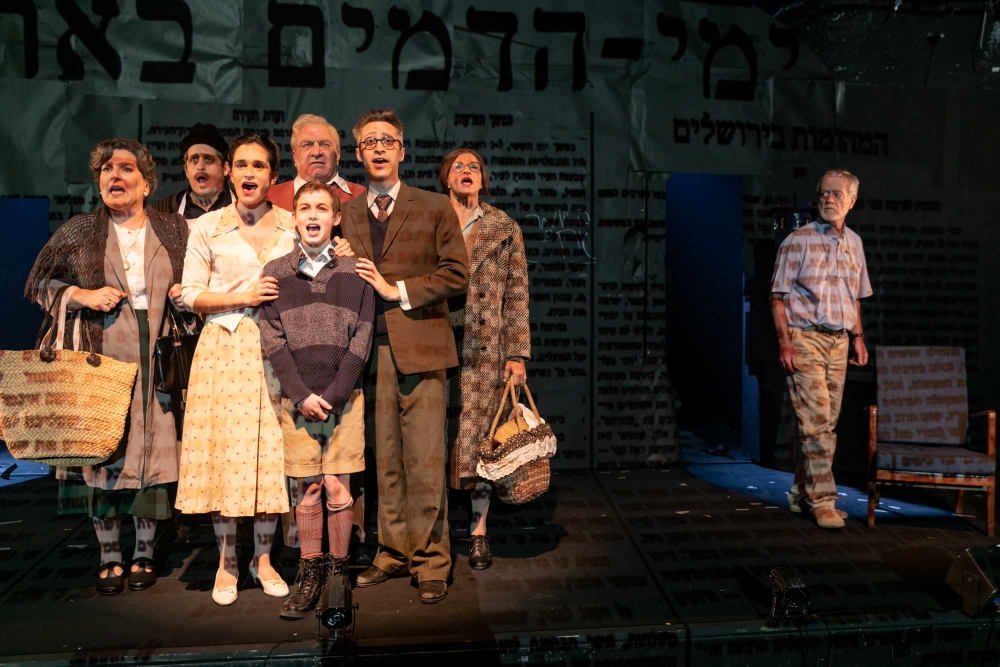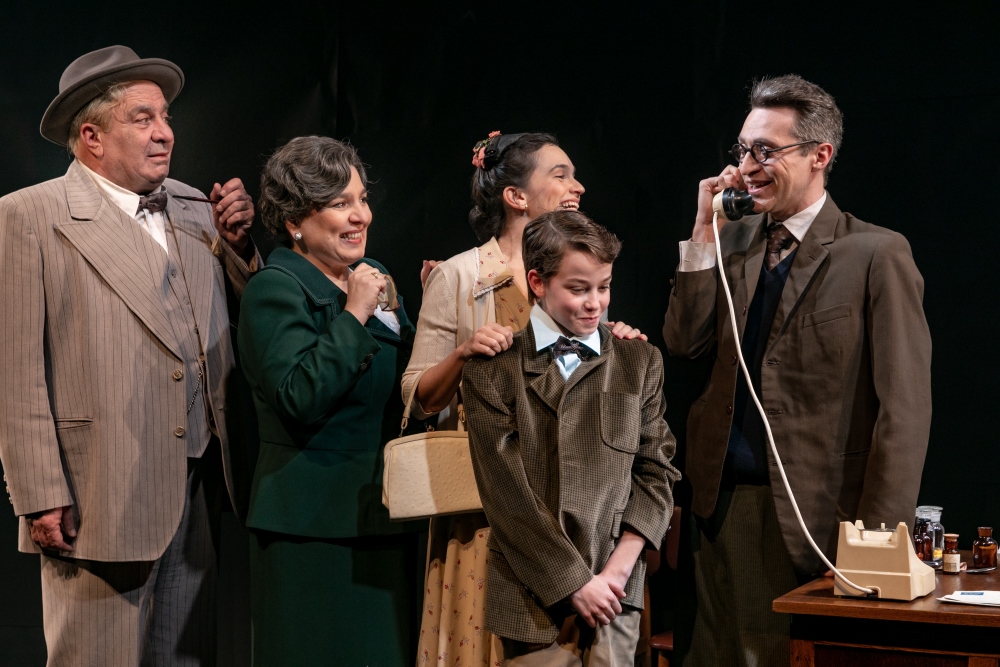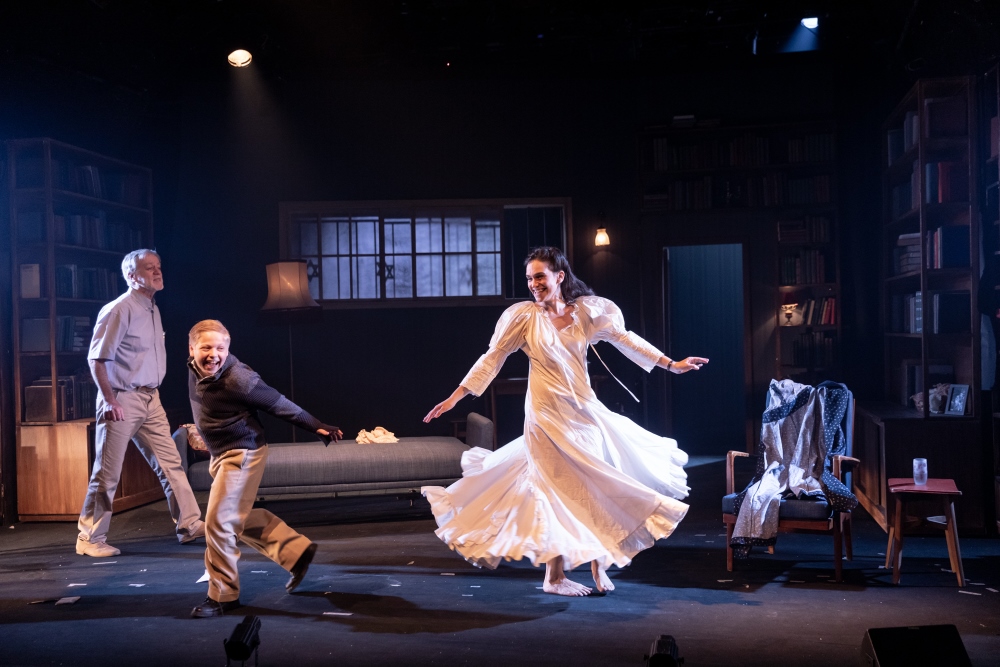
The Khan Theatre production of A Tale of Love and Darkness is an exquisite work of theatre, as Aya Kaplan’s play, based on selections from the eponymous book by Amos Oz, evokes the essence of an era, bringing an intensely private experience of love and loss to vivid life onstage. In the book, the celebrated author recalls his childhood in Jerusalem, during the last years of the British Mandate in Palestine, the War of Independence, and the establishment of the State of Israel. At the heart of this memoir, published in 2002 when the author was over 60, is the suicide of his mother in 1952, when the young Amos was just 12 years old; a private pain that Oz had not addressed in his writing until that time. The densely written and detailed memoir travels a non-linear path for over 500 pages (in the English translation), adapting such a text to the stage requires daring, and Kaplan meets the challenge with bold, creative freedom and a deep understanding of theatre.
Taking the difficulty of conveying the complexity and depth of these experiences as a point of departure, the play opens with Amos the mature, silver-haired author (Yehoyachin Friedlander) at his desk, attempting to write, and frustrated in his efforts. The stage around him is entirely dark and empty, emphasizing the solitude and isolation of this endeavor: the search for words that will express memories and feelings. He is ready to surrender and relinquish the task, and begins packing up, when his family appears, all singing Open the Gates (from the liturgy of Yom Kippur, a Piyyut for Ne’ilah, to music composed by Sasha Argov). Kaplan utilizes the unique aspect of the theatre – its physicality and presence – to manifest the ways in which the past shapes and haunts the present. His mother, father, grandparents and neighbors are literally present for Amos the author, as they are present for the audience; the viewer shares this experience of memory and imagination. And, as families often do, they nag and pester him: When are you going to write about us? We’ve been waiting…
As the past comes to life for the elder Amos – Yehoyachin Friedlander delivers a performance as nuanced and sensitive as it is moving and heart-wrenching – his own younger self emerges as well. Alternately portrayed by Jonathan Bar-Or and Peter Knoller, Amos the boy tears through the black paper that is the backdrop, the boundary between past and present. This dual focal point creates a striking tension in the play, as the viewer experiences events simultaneously through the child and the man.

As an adult, Amos the author is haunted by the past, driven by the anguish of loss and feelings of abandonment, yet the tone of the play is fast-paced, lively and often very funny. The entire cast is excellent, bringing the characters to vivid life in their quirky individuality with outstanding performances. Arie Tcherner is an imposing figure as the grandfather eternally disappointed in a son who can never measure up; while Odelyah Moreh-Matalon is hilarious as his wife, obsessed with the ever-present danger of microbes running rampant in the Levant. Carmit Mesilati-Kaplan and Yoav Hyman bring warmth to their diverse roles as friends and neighborhood characters. Vitali Friedland invites one’s empathy as Arieh Klausner, an intellectual constantly facing rejection by the academic circles to which he aspired. Dedicated to his ideology, bewildered by the harsh realities of his life, Friedland conveys the internal conflicts and contradictions of the man with expressive physicality, embodying the sense of weakness and utter dejection, as well as the defensive stiffness and rigidity. Yet the enigma at the heart of the play is beautifully conveyed by Tamar Alkan Meushar, as Fania, whose intensity is incandescent, burning brightly in moments of light-hearted pleasure, and the solitary suffering of a tortured soul.
The play is suffused with music and movement. The songs reflect the mood and spirit of the personal narrative, as well as the historical context. As the young Amos cavorts onstage with his mother Fania in fanciful flights of imagination, the happiness and intimacy of their connection is palpable. As one watches these magical moments along with the elder Amos (Yehoyachin Friedlander), experiencing the joy and wonder, the viewer is also open to experiencing the pain and loss.

Certain to resonate with those familiar with the writing of Amos Oz, the play is so well structured, self-contained with a strong appeal to the emotions and senses, that even someone who has never read anything by the author will easily connect and relate to the story. The set and costumes, designed by Adam Keler and Svetlana Breger respectively, succeed in conveying the inherent drama of a unique time, as the events of an individual’s life are magnified and intensified through the experience of witnessing and living history in the making.
The past cannot be changed, one can only watch it unfold over and over again in memory. All that can change is our understanding of the past, and our feelings. As the play approaches its inevitable conclusion, Amos the author is alone with his mother Fania, an encounter that is only possible in the realm of imagination. In this moment, as he leans into her, Friedlander reveals the child within the man, the vulnerability and the strength that can be found in acknowledging those feelings, and in that unity, the acceptance of those feelings, there is closure, and perhaps even comfort.
A Tale of Love and Darkness
A period drama based on selections from the novel by Amos Oz
Written and directed by Aya Kaplan; Dramaturgy: Shahar Pinkas; Set and Design: Adam Keler; Costume Design: Svetlana Breger; Lighting Design: Roni Cohen; Music: Dori Parnes; Choreography: Amit Zamir; Video Art: Guy Romem – Studio Insight; Cast: Yehoyachin Friedlander, Tamar Alkan Meushar, Vitali Friedland, Odelya Moreh-Matalon, Arie Tcherner, Carmit Mesilati-Kaplan, Yoav Hyman, Jonathan Bar-Or / Peter Knoller





